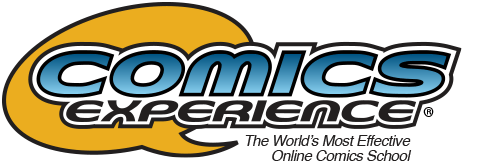
This past January, Rich Douek’s Gutter Magic hit the top 300 comics of the month – the first title of the Comics Experience and IDW partnership to achieve such an honor! He is accompanied by Brett Barkley on art, Jules Rivera on colors, and fellow Creators Workshopper Nic J. Shaw on letters, and the series has received stellar reviews from Ain’t It Cool News, Multiversity Comics, Comicosity, and more.
Gutter Magic envisions an alternate present where magic and science not only co-exist, but sometimes work in tandem with one another; World War II’s outcome was determined by forces a little more supernatural than the ones utilized in our timeline. Protagonist Cinder Byrnes, not much of a wizard himself, needs to collect spell fragments to reverse his fortunes.
Those with a bit more adroitness in such arts have a completely different idea… and Rich’s vibrant ride transcends genres to offer breakneck adventures with agonizingly human stakes.
Comics Experience: You come from a copywriting background. How has this impacted your comics career? What sort of overlaps do you see between the two different styles?
Rich Douek: Well, for one thing, it’s made writing solicitation copy a lot easier! Haha. Seriously, though, I feel like the biggest benefit of my copywriting background is that I get to write every day, and use writing to come up with solutions to problems. It’s mostly a matter of being able to slip very easily into a writing mindset, and knowing what questions to ask myself when I’m feeling stuck on something.
I’d say the biggest overlap is that in writing ad copy, you need to be clear and concise while getting your message across – clever doesn’t hurt either – and with comics, that’s something to strive for both in writing scripts for the artists you work with, and the dialogue that people will read.
CE: Do you believe that writers are best served if they can work in and adapt to multiple mediums?
RD: I think the more versatile you can be, the better, which Is why I always jump at the chance to work in different mediums. It helps to understand what works in some, and might not work at others, and in the end, learning the ins and outs of various mediums will help the work you produce specifically for them, and just your writing chops overall.
CE: How have you used your copywriting experience in the marketing of Gutter Magic? Do you have any tips for your fellow creators about promotions best practices?
RD: Marketing your book is basically reaching out to people and asking them to do you a favor – so you really want to be nice, communicative, and appreciative when you do get some press coverage or retailer responses. To the utmost possible extent, strive for a personal connection with the people you contact, and make it as easy as possible for them to say yes to what you’re asking them to do.
CE: How should creators forge a personal relationship with fellow pros without seeming demanding or disruptive?
RD:What it all comes down to is respect. You need to respect the fact that this person is working on their own career, and has no obligation to help yours. Respect them enough to not come out of the gate asking for or expecting favors – just let them know you’re a fan of their work, and what it is about them that makes you want to share yours with them. And that’s it. Maybe they will get back to you, and maybe they won’t. If they don’t, respect the fact that they may be too busy, and don’t hold it against them. And as much as you can, make things a two-way street – if you love what they’re working on, tell people – even if you only have 10 people following you on twitter, tell those 10 people. It will be appreciated. But again, be genuine in your interest, and don’t assume or expect anything in return. Just let things develop naturally, and you’ll be fine.
CE: In the Gutter Magic universe, science and magic co-exist, and certainly seem to overlap. How much impact has each discipline had on the other in your world’s history? What other famous scientists besides Oppenheimer may have dabbled? No spoilers, of course.
RD: Ha, very tricky to answer without spoiling anything, but let’s just say I’m very open to involving other historical figures. I mean, if you look in the real world, you have people like Jack Parsons, who was both a rocket engineer and a disciple of Aleister Crowley – and looking strictly at the technology and aesthetics of the book, I wouldn’t be surprised if Nikola Tesla’s name came up here and there. But, none of that is going to be exactly spelled out in this miniseries – though you will learn plenty about the interplay between science and magic in issue #4!
CE: Did you pull any inspiration from the Crowleys and Parsons of the world when writing? And what do you think compels people of science to be attracted to magic – and vice versa? Will Gutter Magic touch on this?
RD: I think part of the allure of magic is that it’s a way of bending the universe to your will. Science is all about discovering how the universe works, while magic is all about making the universe work according to your will – something that I’m sure is attractive to almost everyone.
Gutter Magic does touch on this, especially in issue 4, but I will say that if magic were real, and could be studied empirically just like any other natural phenomenon, I think scientists would be jumping at the chance to do so.
CE: Gutter Magic seamlessly incorporates elements of steampunk, science fiction, and even a touch of westerns into its fantasy world. What do you find most appealing about working with merged genres?
RD: My favorite thing about it is that it just opens up more possibilities, more unexpected combinations, and more ways to set your story apart from conventional genre tropes. It’s almost like sampling in hip-hop or EDM – you take these pre-existing things, put them in a new context, and end up with something unique and awesome.
CE: Yeah, mashups are fun and inventive when done right! It’s like a puzzle. How did you decide what elements to take from the different genres incorporated into Gutter Magic, and which to ignore?
RD: I think it’s a matter of figuring out what works for the story and what doesn’t. The great thing about mixing and matching is that you’re not beholden to any genre conventions, so if you feel like something’s not working, you can just jettison it. Above all, you have to take the pieces that work for your characters and your story, and get rid of anything that’s extraneous or hindering.
CE: Please describe the role the Creators Workshop played in helping you develop Gutter Magic? Does any particular piece of advice stick out?
RD: The Creators Workshop was a great resource for me in terms of fleshing out the story. I not only had seasoned pros reviewing my work at every stage, but valuable insights from my peers. If I had a piece of advice for fellow workshop members, or people considering joining, it would be to definitely submit your work, and take the critiques to heart – without exception, everyone participating wants your book to be the best it can be.
CE: And what are some healthy ways for writers to process and implement critique?
RD: One of the most valuable pieces of advice I have ever gotten was from a college professor of mine, Lawrence Rosenfield. He said that you should take it all to heart, but not take it personally. What I take from that statement is to take criticism seriously, but to realize that it’s not an attack on you, or your work. At its heart, critiques are just the critic’s opinion of what was read – not necessarily correct, not necessarily useful, but generally just an honest telling of what they did or did not understand. It’s up to you as a writer to weigh the critique and see how much, if any, of the notes you want to implement, but if you can detach yourself from taking critiques personally, and viewing them as a judgment on your work, you’ll be able to see so much more clearly where your story could use some work. And every story needs work – being able to admit that about your own work is probably the single most important thing you can do for yourself as a writer.
Gutter Magic is available monthly in print wherever comic books are sold, or digitally on comiXology.
——————————————-
Posted by Meredith Nudo

